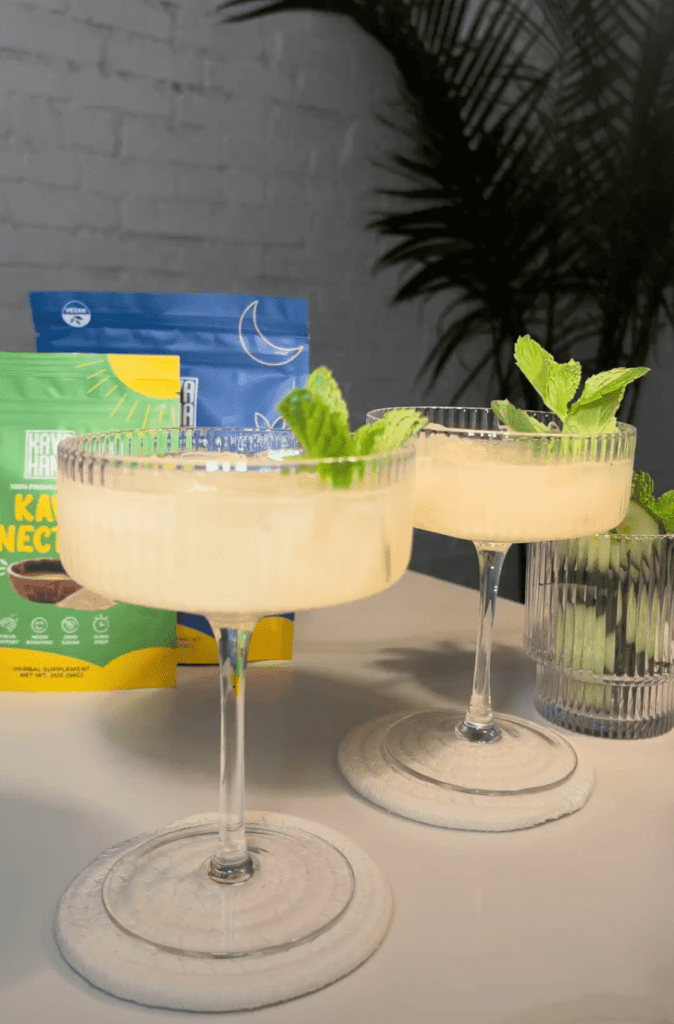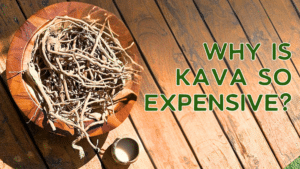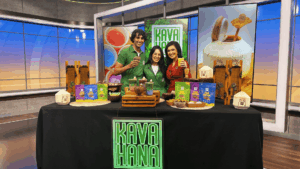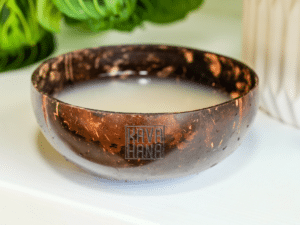If you don’t drink alcohol, hanging out in social settings can be a challenge. You want to spend time with your friends, but not drinking can make you feel on the outside of things. The heightened social energy and the loss of inhibitions can certainly create a particular setting. That’s where drinking kava comes in.
Kava is a plant-based drink from the Pacific islands. It’s been used for over 3000 years by islanders in religious and traditional ceremonies and as a plant medicine. The tea-like drink comes from the pepper plant, piper methysticum. Its roots are dried and ground into a powder and steeped in water to be drunk for its calming and mentally relaxing effects. These effects are similar to alcohol but without the side effects.
But how does that work?
It can certainly be confusing to hear that something can give you the same feelings as alcohol without the negative effects. How can they work the same way, give you the same feelings, but be better for you? It’s all about how it works in your brain and body.
Kava and the brain
Kava is made up of kavalactones, the active components of the kava root. There are six main types linked to how kava makes us feel. They come in two different categories: heady kavas, which make us feel clear, calm, and social, and heavy kavas, which make us feel tired and our bodies heavy.
These special chemicals act directly in the brain to change some of your key neurotransmitters. Neurotransmitters are chemical messengers responsible for communicating signals and instructions between the brain cells and the body. Some popular neurotransmitters are dopamine and serotonin, which are important players for your mood, motivations and how you manage emotions.
When it comes to drinking kava, the neurotransmitter most impacted is gamma-aminobutryic acid (commonly known as GABA). GABA is an inhibitory neurotransmitter, meaning it slows down signals being fired between brain cells. This is how GABA makes you feel relaxed and calm. It’s also a well-known therapeutic target for treating anxiety disorders.
Kava seems to work by changing the GABA receptors, which changes how much GABA is released into the cell and how we feel. Kavalactones increase the number of GABA receptors, increasing the amount of GABA in our brain and making us feel calm.
Interestingly, alcohol also acts on GABA neurotransmitters, which is why you feel calm and relaxed after drinking a glass of wine or a beer. However, there are some key differences.
Drinking kava boosts your mood without the emotional crash
One of the key differences between drinking kava and alcohol is that the mood-boosting feelings you get from kava stay the same as you drink it. Those feelings of calm, sociability, and clarity stay steady rather than changing to emotions like anger and aggression that often come with alcohol. Plus, when drinking kava, you don’t get depressed and sad feelings the next day. This is what often drives people to want to start drinking again, repeating the cycle.
These emotional benefits are one of the main reasons people like drinking kava. The impact on the GABA system can help reduce anxiety, both social and general anxiety, and has also been shown to help those who have depression paired with their anxiety. Research shows that kava may work better than some anxiety medications in reducing anxious symptoms. So, if you struggle with some of these emotional challenges and don’t like to take medications, kava may be a great option. (But be sure to talk to your doctor about it first.)
Kava helps you sleep
Kava can also help with sleep quality and sleep disorders like insomnia. Because heavy kavas can make you tired, research has started investigating how they can help people fall and stay asleep. The kavalactone, called kavain, has been shown to significantly improve sleep in a model of insomnia. This may also be related to helping to calm the anxious mind, often accompanied by sleep difficulties.
While alcohol initially makes you feel tired, it can actually disrupt your sleep patterns by waking you up as it leaves your bloodstream. Alcohol can also affect your circadian rhythm, or sleep-wake cycle, which can affect the quality of your sleep and how rested you feel.
Sleep is critical to maintaining mental and physical health. If we don’t get enough sleep or don’t sleep well, it can significantly affect our cognitive abilities, such as learning, memory, and executive functions, which, over time, can seriously impact our lives and relationships.
Your cognition isn’t affected in the same way
Unlike alcohol, kava can help you feel relaxed without affecting your cognitive abilities. This means you can still have meaningful conversations and daily activities without feeling impaired. While you can feel a bit of a “buzz” it’s more of a relaxing feeling rather than a cognitive effect.
Alcohol affects the brain in two ways: it increases GABA and decreases excitatory neurotransmitters. This means it not only makes you feel tired but also impacts your cognitive abilities. This is why you get slurred speech, feel off balance, and think slowed down, along with other cognitive challenges.
Kava only acts on your brain in one way: through your GABA system. That’s why you feel tired but can still do things without feeling impaired. However, some reports show you can drink too much kava, which makes you feel really tired. When this happens, it’s best not to drive so you don’t risk falling asleep at the wheel.
There’s no hangover from kava
One of the worst things about drinking alcohol is the hangover. Waking up with a headache, feeling sick and groggy, brain fogged and just crappy. Hangovers come from dehydration. Alcohol is a diuretic. That means it naturally causes you to get rid of water. That’s why you have to pee so much during a night out.
Kava doesn’t dehydrate you. It’s a water-based drink that helps keep you hydrated and doesn’t act as a diuretic, so you expel water normally.
Another factor is the difference in the culture between the two. Alcohol is often overconsumed. In the US, people often drink to get drunk, lose inhibitions, and escape. But it’s that mindset that leads to hangovers and feeling so emotionally and physically bad the next day. Kava, on the other hand, isn’t drunk for its effects. The culture around drinking kava is focused on community, connection, and spending quality time with the people you’re with. While kava can make you tired and give you a bit of a buzz, it’s only mild, and you need to drink a lot to get to that level.
There’s no risk of physical addiction when drinking kava
Addiction and dependence come from needing more of a substance to get the same effects. This is called tolerance. This is how alcohol works. After long-term use, it also can change how your brain works, becoming dependent on alcohol to function. This is what leads to addiction and why it can be so difficult to stop drinking; your brain has to actually re-learn how to work without alcohol.
Drinking kava does not change how your brain works, so there is no risk of physical dependence. However, it can be habit-forming because of how it makes people feel. Users can become attached to kava’s social, relaxing effects, so it’s important to have a healthy relationship with it and drink it responsibly.
What this all means
We are huge supporters of a sober lifestyle and want to support people choosing that to make it easier. It can be hard to be sober in our culture. While we don’t want to shame or demonize alcohol, we want people to know that there are some great alternatives if you want to stop drinking alcohol, cut back, or just try something new.
If you’re in the L.A. area, come and visit our bar! We have a great menu of all sorts of kava drinks that you can try and see if you like how it makes you feel. If you’re farther away, our Kava Nectar is a great at-home option for drinking kava at home.
* Please note that the majority of kava research pertains to kava extracts, which often undergo significant processing and may contain additional ingredients and fillers that can influence their efficacy. It is crucial to consider this distinction when reading about kava studies. To draw an analogy, enjoying natural kava as a beverage can be likened to experiencing a freshly brewed cappuccino, whereas kava extracts are akin in functionality to a caffeine pill. Both forms have their unique benefits and can cater to different preferences and needs. While it’s helpful to understand research on kava extracts, please view it critically and remember that natural kava offers a uniquely holistic experience.







